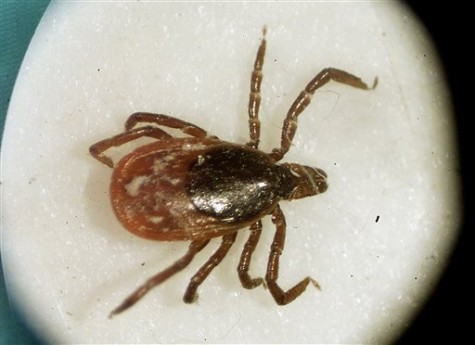With spring and summer comes tick season. These tiny pests present a huge problem on Cape Cod and can may pose a big risk to your health.
Most people know about the dangers of deer ticks, but American Dog ticks (also known as wood ticks) are also common on Cape and just as dangerous. While deer ticks carry and spread Lyme disease, dog ticks do not. However they do carry nasty diseases such as canine ehrlichiosis, babesiosis, anaplasmosis, and borrelia miyamotoi.
Dog ticks can spend their entire life cycle indoors, surviving frigid temperatures. And while dog ticks prefer dogs (hence the name) they can – and do – sometimes choose human hosts. Be sure to check your pets regularly, as they serve as great carriers for ticks, and will bring them into your home.
There Is A Cure For Tick-Borne Diseases
The most common myth about tick-borne illnesses is that there is no cure for them. But in fact if they are caught early, diagnosed correctly, and treated promptly, they can be cured. This is especially important for visitors to Cape Cod who live in other parts of the country where doctors are not as familiar with the symptoms of tick diseases.
“I always tell people that permethrin-treated clothing is the most effective tool in the box,” says Larry Dapsis, entomologist and coordinator of Barnstable County’s Deer Tick Project.
According to Dapsis, Barnstable County has the fourth-highest rate of tick bites in the state. To guard against becoming their next victim, Dapsis recommends purchasing permethrin treatment for your clothing and treating your shoes regularly with permethrin. Also, when walking in the woods or grass, wear light-colored clothing, tuck your pants into your socks, do regular tick checks, and throw your clothes in the dryer for 20 minutes when you get home.
A Growing Danger
In 2013 alone, 4,080 confirmed cases and 1,585 probable cases of Lyme disease were reported in the state. Massachusetts Department of Public Health records show that the amount of confirmed Lyme disease cases has been on the rise since 2009. The highest incident rates were among children ages 5-9 and in adults ages 65-74, with the majority of cases reported in June, July, and August.
“Ticks have probably been here a very long time and have basically re-emerged with a vengeance in the past 20 to 30 years,” Dapsis said. “This has been attributed to a number of things: forest regrowth, suburban housing which fragments habitat, a growing deer population, etc. A lot of people want to blame this all on the deer. While deer play a role, these ticks feed on at least 125 different vertebrate hosts…it is a complex ecosystem with a lot of moving parts.”
One Bite Can Change Your Life
Dapsis added that most people tend to remove ticks incorrectly. The correct method is to “use pointy tweezers, grab the tick by the head and pull straight up making sure to avoid twisting.”
After removing the tick, treat the area with antiseptic and keep the tick in a secure container so it can be tested. A procedure that once cost $50 for patients and now only cost $15 thanks to a grant from Cape Cod Healthcare. Go to tickdiseases.org for more information.
Dapsis’ motto and reminder to the community is, “One bite can change your life.”
— By Kaitlyn Holzworth


























Speak Your Mind